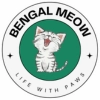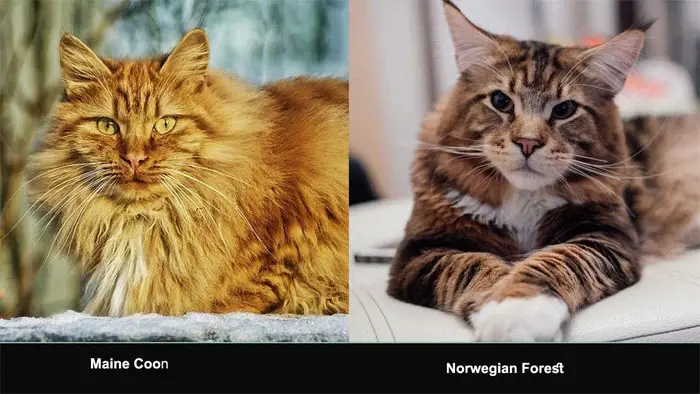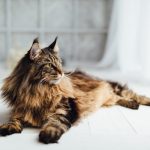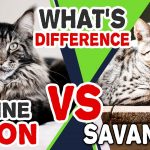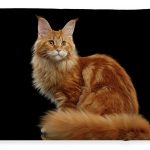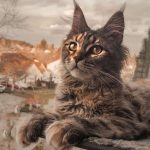Maine Coon Cat Lifespan: Discover the Secrets to their Longevity
The Maine Coon cat has an average lifespan of 12 to 15 years. Maine Coon cats are known for their majestic appearance and gentle nature.
Originating in Maine, United States, these cats are believed to have descended from crosses between domestic cats and longhaired cats brought by seafarers. They are known for their large size, tufted ears, bushy tails, and friendly personalities. Maine Coon cats are adaptable and can thrive in indoor or outdoor environments.
Despite their hardy nature, Maine Coon cats can be prone to certain health issues such as hypertrophic cardiomyopathy, hip dysplasia, and spinal muscular atrophy. To ensure a long and healthy life for your Maine Coon cat, regular veterinary care, a balanced diet, and plenty of love and attention are essential.
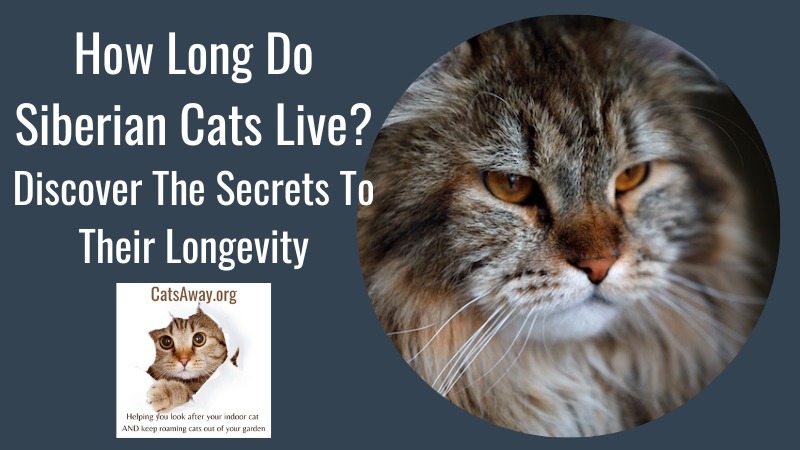
Credit: catsaway.org
Understanding The Maine Coon Cat Breed
Discover everything you need to know about Maine Coon cats, from their fascinating history to their unique physical characteristics. If you’re considering adding a Maine Coon to your family or simply curious about this majestic breed, read on to gain a deeper understanding of these remarkable felines.
Brief History And Origins Of The Maine Coon Cat
The Maine Coon cat breed boasts a captivating history that adds to its allure. While there are several theories surrounding their origins, one popular story suggests that Maine Coons were born from the union of six Turkish Angora cats that arrived in Maine aboard Marie Antoinette’s ship during the French Revolution. These Angora cats then bred with local short-haired cats, resulting in the handsome Maine Coon breeds we know today.
Physical Characteristics And Unique Traits Of The Maine Coon Cat Breed
Maine Coon cats have a distinctive set of physical characteristics that make them stand out from other breeds. Here are some notable traits of Maine Coon cats:
- Size: Maine Coons are known for their large size, with males weighing anywhere between 13 to 18 pounds, and females ranging between 8 to 12 pounds. Some exceptional individuals can even exceed these weight limits.
- Coat: The Maine Coon breed features a long, thick, and shaggy coat that helps protect them from the harsh New England winters. It comes in various colors and patterns, from solid colors to tabbies, tortoiseshells, and calico.
- Ear Tufts and Lynx Tips: One of their most distinguishing features is the tufts of hair on their ears, which resemble the tufts of a lynx. These adorable ear tufts give Maine Coons a regal and enchanting appearance.
- Tail: Their luxuriously long and bushy tails are another signature characteristic of the Maine Coon breed. Their tails are wider at the base and taper towards the tip, making them resemble a plume or a raccoon’s tail.
- Personality: Maine Coons are known for their friendly, sociable, and affectionate nature. They are often referred to as “gentle giants” due to their loving demeanor and their tendency to get along well with other cats, dogs, and children.
- Intelligence: These cats are highly intelligent and curious, always exploring their surroundings and finding new ways to entertain themselves. They have a knack for problem-solving and can be easily trained, making them a joy to have as companions.
Understanding the history and unique characteristics of the Maine Coon breed allows us to appreciate their remarkable qualities even more. Their intriguing origins and exceptional physical attributes add to their charm, making them one of the most beloved cat breeds worldwide.
Factors Affecting The Lifespan Of Maine Coon Cats
Understanding the factors that affect the lifespan of Maine Coon cats is crucial for cat owners who want to ensure their furry friends live long and healthy lives. From genetic factors to environmental conditions, several elements contribute to the lifespan of these majestic felines. Let’s delve into some of the key factors that influence how long Maine Coon cats can live.
Genetic Factors And Hereditary Health Issues
Maine Coon cats are generally considered a hardy breed, but like any other animal, they can still be susceptible to certain genetic factors and hereditary health issues. Some common health issues that Maine Coon cats may face include:
- Hypertrophic cardiomyopathy
- Hip dysplasia
- Spinal muscular atrophy
It’s important for Maine Coon cat owners to be aware of these potential health issues and take appropriate measures to monitor their cat’s health regularly. Regular veterinary check-ups and early detection of any potential issues can significantly contribute to a longer and healthier life for your feline companion.
Importance Of Proper Nutrition And Diet For Longevity
Just like humans, a balanced and nutritious diet plays a critical role in the longevity of Maine Coon cats. Providing your cat with high-quality cat food that meets their specific nutritional needs is vital. Maine Coon cats have a larger body frame compared to other cats, so it’s essential to ensure they receive the right amount of nutrients, including protein and essential fatty acids.
A well-balanced diet can help prevent obesity, a common problem in Maine Coon cats, which can lead to various health issues and reduce their lifespan. Ensuring your cat’s diet is rich in lean protein, vitamins, and appropriate portion sizes will contribute to their overall health and longevity.
The Impact Of Exercise And Physical Activity On Lifespan
Regular exercise and physical activity are crucial for maintaining the overall health and well-being of Maine Coon cats. These cats are known for their playful and adventurous nature, making it essential to provide them with ample opportunities for exercise.
Engaging your Maine Coon cat in interactive play sessions, providing them with stimulating toys, and creating a cat-friendly environment can help ensure they get the exercise they need. Regular physical activity not only helps keep your cat mentally stimulated but also improves muscle tone, flexibility, and cardiovascular health, ultimately contributing to a longer lifespan.
Environmental Factors And Living Conditions
The living conditions and environment in which your Maine Coon cat resides can significantly impact their lifespan. Cats thrive in a calm and stress-free environment, so it’s essential to provide them with a safe and comfortable living space.
Avoid exposing your cat to excessive noise, toxic substances, and hazardous objects. Providing appropriate scratching posts, comfortable resting spots, and regular cleaning of their litter box are essential for their overall well-being. Additionally, ensure that your Maine Coon cat has access to fresh water at all times and make sure their living space is well-ventilated.
By considering these environmental factors and providing a nurturing living space, you can help extend the lifespan of your beloved Maine Coon cat.
Remember, while these factors play a significant role in the overall lifespan of Maine Coon cats, each cat is unique. It is important to provide individualized care, regular veterinary check-ups, a balanced diet, and an enriching environment to ensure the best possible life for your feline friend.
Common Health Issues In Maine Coon Cats
Maine Coon cats are known for their robust and sturdy nature, but they are still prone to certain health issues. It is essential for Maine Coon cat owners to be aware of these common health problems in order to provide the best care and ensure a long and healthy life for their beloved feline companions. In this article, we will discuss three specific health issues that are frequently seen in Maine Coon cats: hypertrophic cardiomyopathy, hip dysplasia, and spinal muscular atrophy.
Overview Of Health Issues Specific To Maine Coon Cats
Maine Coon cats are more susceptible to certain health conditions due to their genetic makeup. While they are generally healthy cats, it is important to be proactive in monitoring their health and recognizing any signs of potential issues. Here are three common health problems that Maine Coon cats may face.
Hypertrophic Cardiomyopathy: Causes And Management
Hypertrophic cardiomyopathy (HCM) is a common heart disease in Maine Coon cats. It involves the thickening of the heart muscle, which can lead to heart failure if left untreated. The exact cause of HCM is still unknown, but it is believed to have a genetic component. Regular veterinary check-ups, including cardiac screenings, are crucial for early detection and management of HCM in Maine Coon cats. Treatment options may include medication, dietary changes, and lifestyle adjustments to minimize stress on the heart.
Hip Dysplasia: Symptoms, Prevention, And Treatment
Hip dysplasia is a developmental disorder that affects the hip joints. Maine Coon cats may be predisposed to this condition due to their large size and heavy build. Symptoms of hip dysplasia can include difficulty walking, lameness, and pain. Prevention is key, and it can be achieved by maintaining a healthy weight for your Maine Coon cat and providing regular exercise. In severe cases, surgical intervention may be necessary to improve the cat’s quality of life and alleviate pain.
Spinal Muscular Atrophy: Understanding The Condition And Its Impact On Lifespan
Spinal muscular atrophy is a neurodegenerative disease that affects the muscles, leading to weakness and decreased mobility in Maine Coon cats. This condition is inherited and typically manifests in kittens at a young age. It can have a significant impact on the cat’s lifespan and quality of life. While there is no cure for spinal muscular atrophy, supportive care and physical therapy can help manage the symptoms and improve the cat’s overall well-being.
In conclusion, Maine Coon cats are generally healthy and resilient, but they can still be prone to certain health issues. By staying informed about these specific conditions and being proactive in their care, Maine Coon cat owners can ensure a longer and happier life for their feline companions.
Longevity Tips And Care Guidelines For Maine Coon Cats
Maine Coon cats are known for their impressive size and friendly personalities. With proper care and attention, these cats have the potential to live long and healthy lives. In this section, we will discuss some essential longevity tips and care guidelines that can help ensure your Maine Coon cat lives a happy and fulfilled life.
Regular Veterinary Check-ups And Preventive Care
Regular veterinary check-ups are crucial for maintaining the health and well-being of your Maine Coon cat. Schedule annual veterinary visits to monitor your cat’s overall health and address any underlying issues early on. Additionally, preventive care measures such as vaccinations, flea and tick prevention, and routine deworming can help protect your cat from common illnesses and parasites.
Proper Grooming And Hygiene Practices For Maine Coon Cats
Maine Coon cats have long, silky fur that requires regular grooming to keep it clean and tangle-free. Brushing your cat’s coat at least once a week helps remove loose hair and prevents matting. Pay special attention to areas prone to matting, such as their ruff and belly. Additionally, regular nail trims and dental care are vital for maintaining your Maine Coon cat’s overall hygiene.
Appropriate Exercise Routines And Stimulation For A Long And Healthy Life
Maine Coon cats are naturally active and playful, so providing them with an appropriate exercise routine is essential. Engage them in interactive play sessions with toys and laser pointers to keep them physically and mentally stimulated. Adequate exercise helps prevent obesity and maintains their muscle tone, ensuring a long and healthy life.
Creating A Safe And Enriched Environment For Maine Coon Cats
Maine Coon cats thrive in environments that provide both physical and mental stimulation. Create a safe and enriched living space by providing scratching posts, climbing trees, and interactive toys. This allows your cat to engage in natural behaviors and prevents boredom and destructive behavior. Furthermore, ensure their environment is free from hazards such as toxic plants and chemicals.
By following these longevity tips and care guidelines, you can provide your Maine Coon cat with the best possible care and increase their chances of living a long and healthy life.
Supporting The Longevity Of Your Maine Coon Cat
As a pet owner, it is important to understand how to support the longevity and well-being of your beloved Maine Coon cat. With proper care and attention, these majestic felines can live a long, happy, and healthy life. This includes providing a balanced and nutritious diet, mental stimulation and playtime, understanding the signs of aging, and monitoring overall health and well-being.
Maintaining A Balanced And Nutritious Diet
One of the key factors in supporting the longevity of your Maine Coon cat is maintaining a balanced and nutritious diet. Providing a diet that meets their nutritional needs is essential for their overall health and well-being. Here are some tips for ensuring your Maine Coon cat’s diet supports their long life:
- Choose a high-quality cat food that is specifically formulated for Maine Coon cats. Look for a food that is rich in protein, as these cats have a higher protein requirement.
- Ensure your cat has access to fresh, clean water at all times.
- Avoid overfeeding and monitor your cat’s weight to prevent obesity, which can lead to various health issues.
- Consider including supplements like fish oil or omega-3 fatty acids to support their joint health.
The Importance Of Mental Stimulation And Playtime
In addition to a nutritious diet, mental stimulation and playtime are crucial for keeping your Maine Coon cat happy and healthy. These cats are known for their high intelligence and playful nature, so engaging them in stimulating activities can contribute to their overall well-being. Here’s how you can provide mental stimulation and playtime for your Maine Coon cat:
- Offer a variety of interactive toys that provide mental and physical exercise.
- Create a stimulating environment by providing scratching posts, climbing trees, and hiding spots.
- Engage in regular play sessions with your cat using toys that encourage hunting and chasing behaviors.
- Rotate toys and play areas to prevent boredom and keep them mentally stimulated.
Understanding The Signs Of Aging And Managing Senior Care Needs
As your Maine Coon cat ages, it is important to understand the signs of aging and provide appropriate senior care. Here are some signs to watch out for and tips for managing their senior care needs:
- Monitor for changes in appetite, weight, and water intake, as these can indicate underlying health issues.
- Keep an eye out for mobility issues, such as difficulty jumping or walking, and consider providing ramps or steps to help them navigate.
- Regularly visit the veterinarian for check-ups and senior wellness exams.
- Adjust their diet to meet their changing nutritional needs, such as incorporating joint support supplements.
Monitoring Your Maine Coon Cat’s Overall Health And Well-being
Lastly, monitoring your Maine Coon cat’s overall health and well-being is crucial for supporting their longevity. Regular health checks and observations can help detect any potential issues early on. Here are some tips for monitoring your Maine Coon cat’s health:
- Keep track of their eating, drinking, and bathroom habits to ensure they are consistent.
- Check their coat and skin for any signs of irritation or abnormalities.
- Monitor their energy levels and behavior, looking out for any sudden changes.
- Schedule regular veterinary visits for wellness exams and preventive care.
By following these tips and providing the necessary care and attention, you can support the longevity and well-being of your Maine Coon cat, ensuring they live a happy and fulfilling life by your side.
Frequently Asked Questions On Maine Coon Cat Lifespan
How Long Do Indoor Maine Coon Cats Live?
Indoor Maine Coon cats have an average lifespan of 12 to 15 years.
Do Maine Coon Cats Have Any Health Issues?
Maine Coon cats are generally a healthy breed, but they can be prone to certain hereditary health issues. These include hypertrophic cardiomyopathy, hip dysplasia, and spinal muscular atrophy.
What 2 Breeds Make A Maine Coon?
The Maine Coon breed is a result of the breeding between Turkish Angora cats and local short-haired cats in Maine.
Conclusion
The Maine Coon cat is known for its impressive lifespan, living up to an average of 12 to 15 years. However, with proper care and a healthy lifestyle, some Maine Coons have been known to live well into their late teens or early twenties.
It’s important to provide your Maine Coon with a balanced diet, regular exercise, and routine veterinary care to ensure a long and happy life for your furry friend. So, cherish your Maine Coon and enjoy many wonderful years together!
